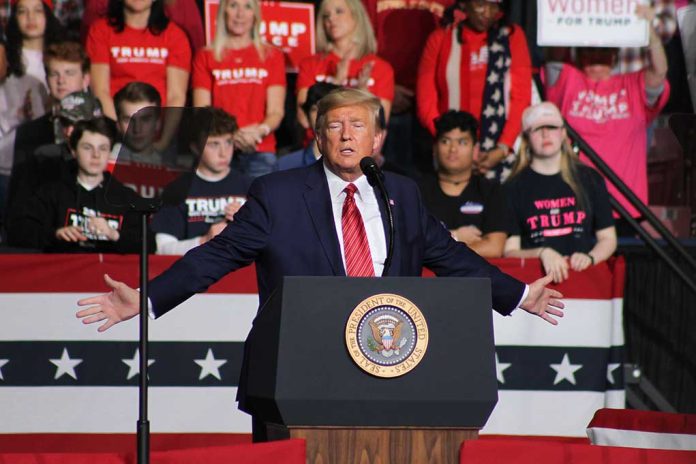
President Trump’s nominee for the 6th Circuit Court, Whitney Hermandorfer, has raised eyebrows for her refusal to take clear positions on established constitutional principles during her Senate confirmation hearing, signaling a new era of ideologically aligned judicial appointees.
Key Takeaways
- President Trump’s hands-on approach to judicial nominations reflects his determination to appoint judges who reliably align with his political agenda
- Whitney Hermandorfer, despite impressive academic credentials, has only six years of legal practice—below the American Bar Association’s recommended experience for federal judgeships
- Hermandorfer’s support for Tennessee’s amicus brief challenging birthright citizenship demonstrates her alignment with Trump’s immigration policies
- During her confirmation hearing, Hermandorfer strategically avoided clear positions on established constitutional principles, raising concerns about her judicial philosophy
- Trump’s new judicial nomination strategy aims to prevent disappointments like previous Supreme Court appointees who occasionally ruled against his policies
Trump’s New Judicial Strategy Takes Shape
The Senate Judiciary Committee recently conducted its first judicial nominations hearing of President Trump’s second term, focusing on nominees for Missouri federal district courts and the U.S. Court of Appeals for the 6th Circuit. This hearing marks the beginning of Trump’s refined approach to judicial nominations, one that emphasizes ideological alignment with his administration’s policies. After experiencing occasional disappointments with Supreme Court justices he previously appointed, Trump has clearly decided that his second-term judicial picks must demonstrate unwavering commitment to his political vision before receiving his nomination.
Whitney Hermandorfer, nominated for the influential 6th Circuit Court of Appeals, exemplifies this new approach. Her impressive academic credentials include being valedictorian and editor-in-chief of the law review at George Washington University. She has also clerked for four federal judges, including three Supreme Court justices. However, her relatively brief six-year legal career falls short of the American Bar Association’s recommended minimum experience for federal judgeships, suggesting that ideological compatibility may have outweighed traditional qualification benchmarks in her selection.
Hermandorfer’s Legal Positions Signal Alignment with Trump
Hermandorfer’s legal positions clearly demonstrate her alignment with President Trump’s policy priorities, particularly on immigration. She signed Tennessee’s amicus brief in a significant birthright citizenship case, supporting the Trump administration’s position against automatic citizenship based solely on birth within U.S. borders. When questioned about this during her confirmation hearing, Hermandorfer attempted to downplay her personal views, stating that “Tennessee did not take an ultimate position with regard to the merits of the executive order,” said Hermandorfer.
She further explained her involvement by suggesting that more historical context was needed in the courts, saying, “We were not satisfied that all of the information regarding the contemporaneous meaning of the Fourteenth Amendment was being presented to the various courts, given that the litigation was proceeding so quickly,” said Hermandorfer.
Strategic Ambiguity on Constitutional Principles
Perhaps most revealing was Hermandorfer’s refusal to take clear positions on fundamental constitutional principles during her confirmation hearing. When asked about the president’s authority to unilaterally suspend habeas corpus—a power that constitutionally belongs to Congress—she declined to provide a straightforward answer. Instead, she offered a carefully crafted response: “That is an issue that is under active consideration by the political branches, and could very well come before me if I were confirmed as a judge. So I think, in prudence, as a judicial nominee, it would not be appropriate for me to pass on the validity of any such arguments,” said Hermandorfer.
This strategic ambiguity appears designed to preserve flexibility for future rulings favorable to executive power—a key consideration for President Trump, who has frequently criticized judicial constraints on his authority. Her unwillingness to affirm established constitutional boundaries suggests a judicial philosophy that might be more receptive to novel legal arguments expanding presidential authority, precisely the type of judicial thinking that would align with Trump’s vision for the courts.
Building a Judiciary Aligned with Trump’s Vision
President Trump’s hands-on approach to judicial nominations reflects his determination to reshape the federal judiciary in ways that will support his policy agenda long after his presidency concludes. The selection of nominees like Hermandorfer, who demonstrate both impressive credentials and ideological compatibility, represents a sophisticated strategy to avoid the occasional disappointments he experienced with his first-term judicial appointments. By prioritizing nominees who have already signaled support for his policy positions through their legal work, Trump is building a judiciary more reliably aligned with his political vision.
Conservative legal scholars have applauded this approach, noting that presidents throughout history have selected judges they believe will interpret the law in ways consistent with their political philosophy. The Trump administration’s current judicial nomination strategy simply makes this process more explicit and effective, ensuring that the federal courts will continue to provide a favorable forum for conservative legal arguments long after his presidency. For Trump supporters, this represents a crucial fulfillment of his promise to transform the judiciary into a bulwark of conservative legal principles.













